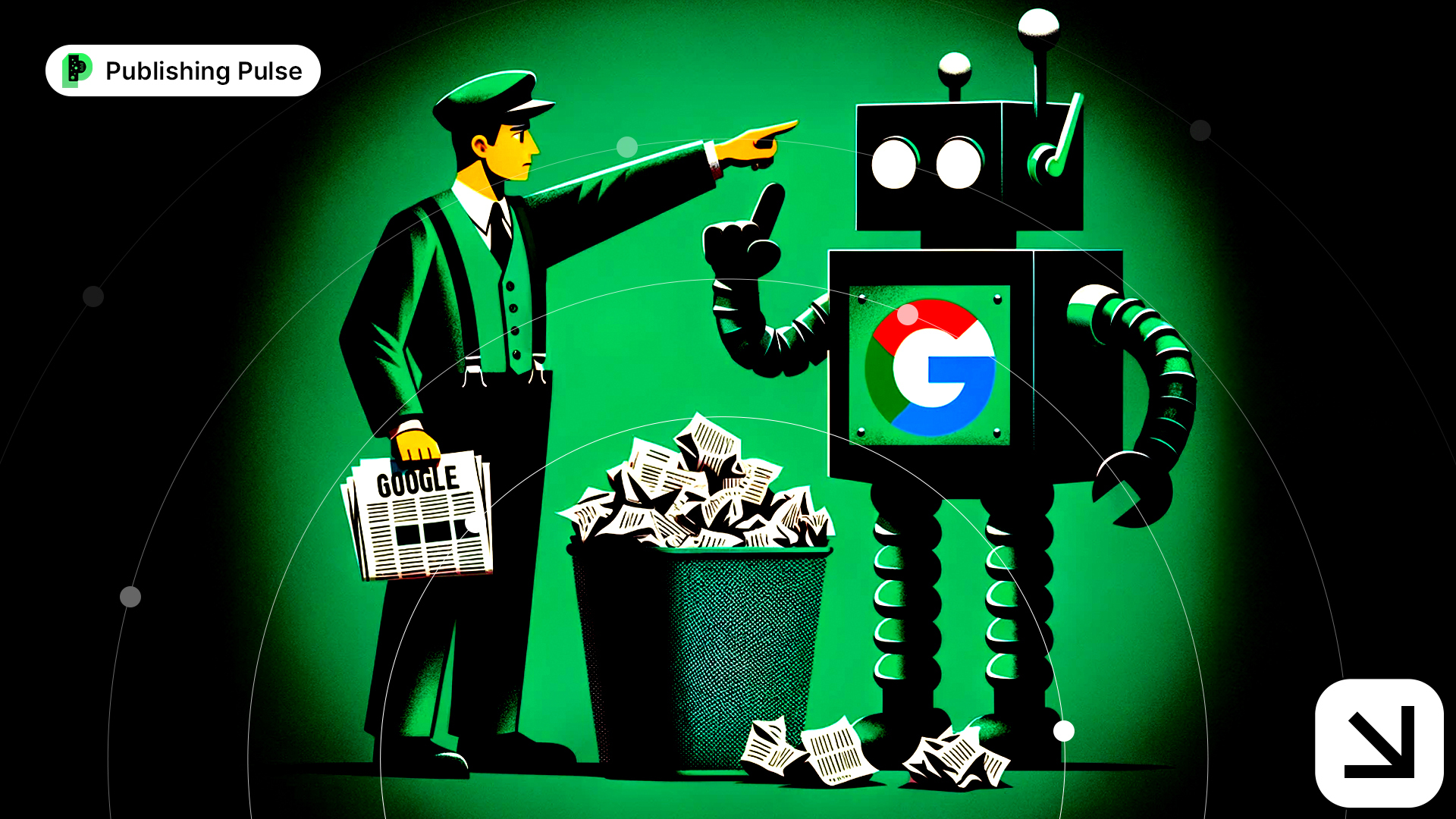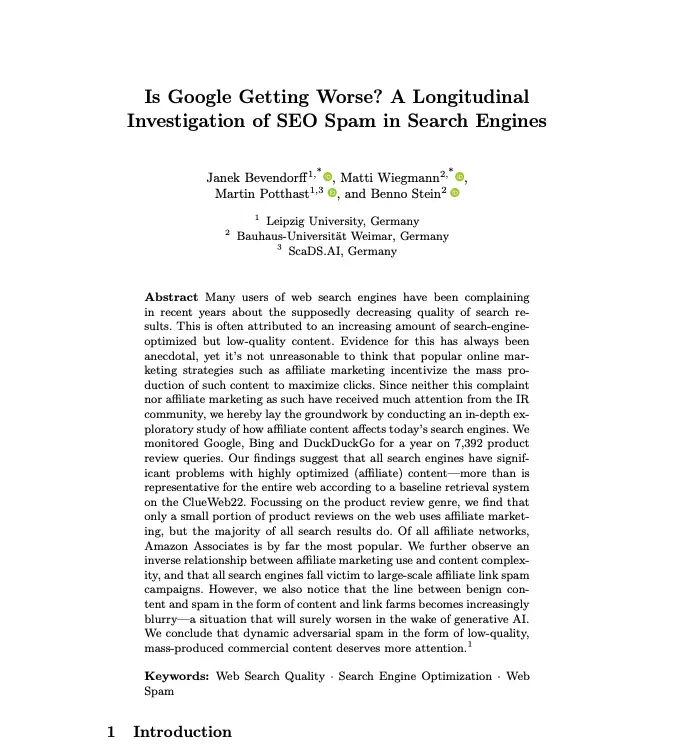
Google Denies Allegations of Promoting Low-Quality AI-Generated Content: Publishing Pulse

Get helpful updates in your inbox
Welcome to Publishing Pulse, your weekly source for industry updates in online publishing. Stay informed about the latest trends and breakthroughs in the ad ecosystem, content creation, SEO, AI technology, and monetization.
If you prefer to listen to industry news, you can tune in to The Publisher Lab podcast. New episodes are released weekly on Thursday.
Google Clarifies Stance on AI-Generated Content in Google News
In response to an article titled “Google News Is Boosting Garbage AI-Generated Articles” by 404 Media, Danny Sullivan from Google Search Liaison clarified that Google News does not prioritize AI-generated content at the top of its search results.
He pointed out that the examples mentioned in the article involved the use of filters and specific search settings to give prominence to AI content, deviating from the default settings of Google News. Sullivan emphasized that Google’s primary focus is on content quality, regardless of its production method, and that low-quality content contradicts its content policies.
On this week’s episode of The Publisher Lab podcast, our host Terrence Timmons comments, “How I see this is someone saw an issue with their site not ranking, tried to find a reason for it, and then threw it on this AI monster saying, hey, AI is the reason we’re not ranking. In reality, it’s a little more nuanced, right? … If your content is good and it answers users’ questions well, it’s helpful to the user and relevant to whatever they’re searching for, it will rank. It could be AI-assisted or not.” Listen to the full discussion here.

Sullivan acknowledged that Google is not infallible and is continuously working to enhance its default ranking systems to ensure the prominence of high-quality journalism. Addressing concerns about new publications like 404 Media appearing in Google News, he explained that it can take time for Google’s algorithms to recognize and feature content from new publishers.
Research Reveals Evolving Challenges in Search Engine Quality and Spam
A research paper conducted by Leipzig University, Bauhaus-Universität Weimar, and ScaDS.AI in Germany conducted an in-depth analysis of the search quality of Google Search, Bing, and DuckDuckGo over a year, specifically focusing on 7,392 unique search queries in the product reviews category.
The study examined search results from October 26, 2022, to September 19, 2023, and its findings shed light on the evolving landscape of search engine results.

The study concluded that addressing “dynamic adversarial spam,” characterized by low-quality, mass-produced commercial content, requires increased attention. While Google’s search results showed some improvement during the study, it emphasized the need for continuous algorithmic updates to combat SEO spam effectively.
The research also highlighted the prevalence of higher-ranked pages being optimized and monetized through affiliate marketing, often at the expense of text quality. Google’s downranking of some affiliate pages towards the end of August 2023 hinted at a potential shift in trend, but the study couldn’t confirm its permanence.
Notably, the study did not examine the last review update in November 2023, and future analyses may face challenges without Google confirming updates.
Consumer Reports Study Reveals Extensive Data-Sharing Practices on Facebook
A study conducted by Consumer Reports has revealed that, on average, approximately 2,230 companies actively share data about each Facebook user with the social networking platform. This data sharing extends to as many as 7,000 companies for some users.
These findings have significant implications for trust and reputation in an era characterized by growing concerns over data privacy. The study also underscores potential legal and ethical concerns, especially in regions like the European Union with stringent data privacy regulations. The research highlighted issues with transparency tools provided by Meta (formerly Facebook), including the lack of clarity regarding the identity of data providers and instances where companies ignored user opt-out requests.
It’s important to note that the study recruited 709 volunteers who shared their Facebook data archives, potentially introducing biases in the findings due to the sample’s privacy-conscious and technically inclined nature. Meta responded by stating that it offers transparency tools to assist users in understanding and managing the information shared with the company.
Publishers Navigate the Complex Landscape of Third-Party Cookie Alternatives
European publishers are showing reluctance towards adopting third-party cookie alternatives that operate outside their control, while many U.S. publishers are more open to using these alternatives when requested by advertisers.
U.S. publishers have been experimenting with various universal identifiers, but they are growing weary of the process and the investment required for testing. Alternative identifiers are more appealing to buyers than publishers because they offer features like frequency capping and attribution, although they often require publishers to surrender some control.
Despite the interest in alternative identifiers, first-party data offerings remain a priority for publishers like Condé Nast and Hearst, with alternative identifiers being tested alongside them. Some publishers, such as Dotdash Meredith and Insider, consider advertiser requests for alternative IDs but prioritize their first-party data offerings. Publishers are also concerned about the role of media buyers in shaping the future of alternative identifiers, which adds to the complexity of the adoption process.
OpenAI CEO Sam Altman Addresses Concerns About AGI’s Impact on Society
OpenAI CEO Sam Altman has expressed a belief that concerns regarding the transformative and disruptive impact of artificial general intelligence (AGI) on the world are exaggerated. While he acknowledges the potential development of AGI in the near future, Altman asserts that its effects on the world and employment will be less dramatic than some anticipate.
He aims to address concerns from AI skeptics about the technology’s societal implications and warns against excessive excitement about AGI’s potential. OpenAI’s primary mission remains to achieve AGI while prioritizing its safe and responsible design.
Altman also recognizes AI’s capacity to exacerbate economic inequalities but emphasizes its potential as a powerful tool for increasing productivity. Concerns about AI safety and OpenAI’s role in addressing them briefly led to Altman’s removal from the company in November, but he was promptly reinstated as CEO, with Microsoft gaining a nonvoting board observer seat upon his return.

Sarah is a social media expert and successful brand marketer. She has experience growing brands and content across multiple different platforms and is always on the cutting edge of emerging social platform and internet culture trends.
Featured Content
Checkout this popular and trending content

Ranking In Universal Search Results: Video Is The Secret
See how Flickify can become the ultimate SEO hack for sites missing out on rankings because of a lack of video.
Announcement

Ezoic Edge: The Fastest Way To Load Pages. Period.
Ezoic announces an industry-first edge content delivery network for websites and creators; bringing the fastest pages on the web to Ezoic publishers.
Launch

Ezoic Unveils New Enterprise Program: Empowering Creators to Scale and Succeed
Ezoic recently announced a higher level designed for publishers that have reached that ultimate stage of growth. See what it means for Ezoic users.
Announcement
